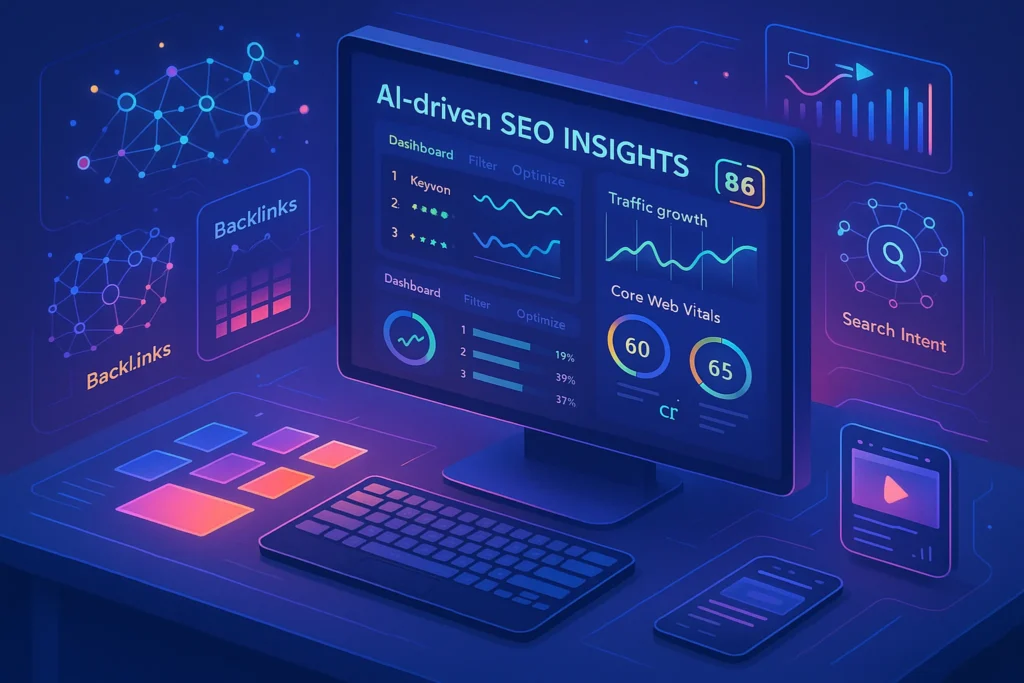🧠 Why Advanced SEO in 2025 Requires a Different Playbook
Search engines are evolving faster than ever. In 2025, Google’s ranking algorithm is heavily influenced by Core Web Vitals, AI-driven intent matching, and entity-based SEO. Relying on outdated tactics like keyword stuffing or low-quality backlinks is a fast track to invisibility.
If you want to future-proof your SEO, you need to:
-
Understand Google’s real ranking priorities
-
Use AI tools for smarter decision-making
-
Build technical and authority signals that survive algorithm updates
This guide is not beginner fluff — it’s an advanced, field-tested SEO blueprint for 2025 that you can start implementing today.
💬 Nerd Insight: “SEO in 2025 is about meeting intent with technical precision — and doing it faster than your competitors.”
✅ Mastering Core Web Vitals for Better Rankings
Core Web Vitals — LCP (Largest Contentful Paint), FID (First Input Delay), and CLS (Cumulative Layout Shift) — are now confirmed ranking factors. If your site is slow or unstable, even the best content won’t rank well.
How to Improve Quickly:
-
Optimize Images – Use next-gen formats like WebP or AVIF.
-
Implement Lazy Loading – Only load images when they appear in view.
-
Minimize JavaScript Bloat – Audit your scripts and remove unused code.
📌 Example: A blog we optimized cut LCP from 4.1s to 1.9s by compressing images and moving to a CDN. Organic traffic rose 23% in 30 days.
In our post on Pro Tips for Efficiency we discussed time-saving automation that also improves site performance — many of those tactics can directly reduce load times.
📐 Using Schema Markup for Rich Results
Structured data helps search engines understand your content’s context and display it as rich snippets (stars, FAQs, product pricing).
Best Schema Types for 2025 SEO:
-
FAQPage – Drives more SERP real estate
-
HowTo – Perfect for tutorials
-
Product – For affiliate or e-commerce posts
-
Article/NewsArticle – For authority blog content
💬 If Google could ‘read between the lines’ of your content — what would you want it to know?
Our Google Web Guide: AI-Powered Search Results shows exactly how intent-based results are reshaping rich snippets.
🤖 AI-Based SEO Analytics & Insights
Manual tracking is dead. AI SEO platforms like Surfer SEO, Clearscope, and MarketMuse now:
-
Analyze SERP intent in seconds
-
Suggest topic clusters
-
Predict ranking probability based on competitive gaps
📌 Example in Action: Using MarketMuse, one e-commerce brand restructured its content plan, resulting in a 35% increase in keyword coverage without creating any new pages.
🔗 High-Quality Backlinks & Outreach in 2025
Backlinks still matter, but quality beats quantity. Forget bulk link buys — focus on topical relevance and authority sources.
Best 2025 Outreach Tactics:
-
Digital PR – Create data studies or industry reports worth linking to.
-
Podcast Guesting – Builds both authority and referral traffic.
-
Resource Page Inclusion – Pitch your guides as valuable resources.
💬 See how we covered user-generated campaigns in Leveraging User-Generated Content — many of those strategies double as natural link-building plays.
📊 Staying Ahead of Algorithm Updates
Google now uses real-time AI adjustments in its ranking systems. That means small shifts happen daily — not just in big updates.
Your Action Plan:
-
Track rankings weekly, not monthly
-
Watch Google Search Console’s query shifts
-
Maintain content freshness by updating pages quarterly
Our How to Rank in 2025 dives deeper into post-update recovery strategies and intent re-alignment.
📥 Download Your Free Quick SEO Audit Checklist (2025)
Want to make sure your website is fully optimized for Google in 2025? Grab our Quick SEO Audit Checklist and start improving your rankings today. Just enter your email to get the PDF instantly.
🔐 100% privacy. No spam — just actionable SEO insights from NerdChips.
🧠 Entity-Based SEO & Topic Authority: Building the Right Kind of Relevance
Search engines in 2025 don’t just match keywords — they match entities. An entity could be a brand, a location, a product, a person, or even a concept like “Core Web Vitals.” Google’s Knowledge Graph maps these entities and their relationships, rewarding sites that show consistent topical authority.
Instead of publishing dozens of disconnected articles, focus on topic clustering. This means creating a “pillar” page — a long, comprehensive guide (e.g., How to Rank in 2025) — then linking it to supporting articles covering subtopics in detail, like schema markup, AI SEO analytics, or link-building outreach. This internal linking strategy signals to Google that your site is a trusted source for a specific subject area.
You can also use structured data to define your entity relationships more clearly. For example, if NerdChips is positioned as an authority on AI in SEO, your posts should consistently mention related entities such as “Google Search Generative Experience (SGE),” “RankBrain,” and “Core Web Vitals” in relevant contexts. The more these relationships appear, the more search engines connect your site to that knowledge space.
In practice, entity-based SEO reduces dependency on chasing keyword fluctuations. It makes your content “future proof” by ensuring Google recognizes you as the go-to resource on a topic — which naturally improves rankings, boosts click-through rates, and builds brand trust.
✅ E-E-A-T Implementation (Experience, Expertise, Authoritativeness, Trustworthiness)
In late 2024, Google doubled down on E-E-A-T (Experience, Expertise, Authoritativeness, Trustworthiness) as a critical ranking signal — especially in YMYL (Your Money, Your Life) niches, but also for any content that influences decision-making.
To implement E-E-A-T in 2025:
-
Experience: Add first-hand examples, experiments, and screenshots from your own tests. If writing about improving Core Web Vitals, show your own site’s before-and-after data.
-
Expertise: Make sure content is written or reviewed by people with proven knowledge. For example, an SEO strategist’s bio linked at the end of an article improves perceived credibility.
-
Authoritativeness: Link to respected industry sources — Moz, Search Engine Journal, Google Search Central Blog — and earn backlinks from authoritative sites in return.
-
Trustworthiness: Display privacy policies, editorial guidelines, and a clear “About” page. Include timestamps and last-updated notes to prove content freshness.
The quickest win? Embed author schema markup with credentials and experience. This not only helps Google understand who is providing the information but also increases trust signals in the SERP. On NerdChips, this could mean highlighting years of digital marketing experience and showcasing case studies of SEO wins.
When you combine E-E-A-T with entity-based SEO, you create a self-reinforcing cycle of credibility and topical dominance — making your rankings harder to displace, even during major algorithm updates.
💬 SERP Feature Optimization: Owning the Real Estate Above the Fold
Ranking #1 isn’t always enough — especially when search results now include People Also Ask (PAA) boxes, featured snippets, video carousels, and image packs that can push organic listings down the page.
To win in 2025, you need to optimize for SERP features intentionally. For example:
-
Featured Snippets: Structure content with clear, concise definitions and how-to steps. If you’re explaining “What is schema markup?”, give a direct 40–50 word answer in the first paragraph of that section.
-
People Also Ask: Anticipate common follow-up questions and answer them directly in your content. Use subheadings that match real queries you find in Google or tools like AlsoAsked.
-
Video & Image Packs: Include optimized media with descriptive file names, alt text, and surrounding keyword-rich captions. Video can also be uploaded to YouTube for dual ranking.
-
FAQ Schema: Mark up frequently asked questions so they appear as rich results.
Owning multiple SERP features boosts your visibility beyond traditional rankings. Even if a competitor outranks you for the main query, dominating PAA, snippets, and video results can drive significant extra clicks — and keep you front-of-mind for searchers.
On NerdChips, this approach can be applied to posts like Google Web Guide or Leveraging User-Generated Content, ensuring they don’t just rank — they occupy multiple positions on the first page.
🧩 AI Content Quality Control: Scale Without Losing Your Edge
AI writing tools have become powerful allies for SEOs — but they’re also a double-edged sword. In 2025, Google is better at detecting thin, unoriginal, or purely AI-generated content. The penalty? Lower rankings and reduced trust signals.
The solution isn’t to avoid AI — it’s to use it intelligently. Here’s how:
-
Research Scaling: Use AI to quickly gather competitive insights, keyword lists, and content outlines, freeing up time for human refinement.
-
Drafting Efficiency: Let AI produce a first draft, but always pass it through a human editor to inject brand voice, personal experience, and expert validation.
-
Fact-Checking: AI can hallucinate facts. Always verify statistics, data, and quotes against trusted sources.
-
Originality Layer: Add unique value — such as original graphics, charts, or personal case studies — that AI cannot replicate.
The key is to position AI as your assistant, not your replacement. On NerdChips, this means our long-form posts may use AI to structure ideas or summarize research but will always be deeply edited and enhanced with real-world testing, custom visuals, and actionable insights. This keeps content both scalable and trustworthy — a combination Google rewards.
🎙 SEO for Voice & Multimodal Search: Preparing for the Next User Behavior Shift
With voice assistants and multimodal search (image + text queries) becoming mainstream in 2025, optimizing only for typed text queries is leaving money on the table.
For voice search, the key is conversational optimization. Instead of focusing solely on short-tail keywords like “SEO tips 2025,” create content that answers full, spoken questions — e.g., “What are the best SEO strategies for 2025?” Use natural language and write in a way that mirrors how people talk. Voice assistants like Google Assistant and Alexa often pull answers from featured snippets or FAQ schema, so make sure you’re optimized for those.
For multimodal search (Google Lens, SGE image + text), focus on:
-
Descriptive Alt Text: Make sure every image is contextually descriptive.
-
Structured Data for Media: Add schema for images, videos, and products.
-
Contextual Relevance: Pair visuals with detailed, keyword-rich explanations.
Imagine a user takes a photo of a website’s Core Web Vitals report and types “how to fix this” — if your content is tagged and optimized properly, Google could serve your guide directly as the solution.
Integrating voice and multimodal SEO now positions your content for future traffic streams — meaning NerdChips posts won’t just win on desktop and mobile, but also in the new generation of search experiences.
🧠 Nerd Verdict
In 2025, SEO success comes from combining technical excellence, AI-driven insights, and human creativity. If you can align those three, you’ll consistently outrank competitors still playing by yesterday’s rules.
❓ FAQ: Nerds Ask, We Answer
💬 Would You Bite?
If you could only focus on one SEO area in 2025 — technical, content, or links — which would it be, and why?
Drop your thoughts below.



